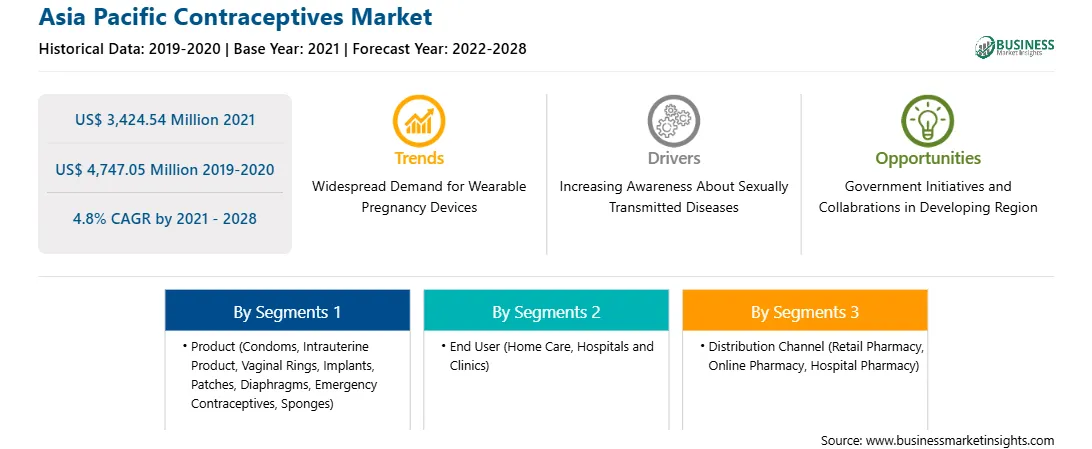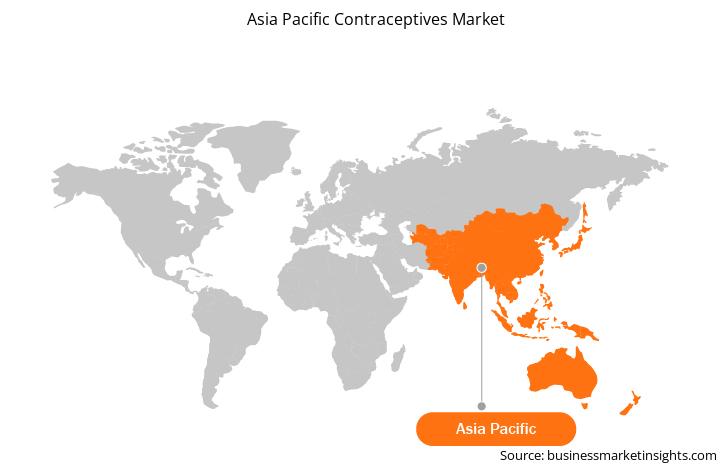The contraceptives market of Asia Pacific includes countries such as China, Japan, India, Australia, South Korea and the rest of Asia Pacific. This region accounted for over fastest growing region of the global contraceptives market in 2020 owing to the rising awareness for unwanted pregnancies, increasing prevalence of STIs and the rapid rise in population in the region. Also, favorable government initiatives for sex education and reproductive health are factors expected to boost the contraceptives market growth in the region over the forecast period. Like any other country across the world, China is facing similar problems regarding sexually transmitted diseases. China has witnessed a rising epidemic of sexually transmitted infections (STIs), including HIV. Female sex workers (FSWs) and their clients, drug users, men who have sex with men (MSM), and migrant workers are groups having high risk of getting a STI. There are an around 2.8 to 4.5 million FSWs; 21.9 to 37.4 million clients of FSWs; 2 to 10 million MSM and 130 million migrant workers in China. Thus, this is likely to increase the demand for condoms in the country. Increasing awareness about sexually transmitted diseases is the major factor driving the growth of the APAC contraceptives market.
Countries in the Asia Pacific are facing challenges due to increasing incidences of COVID-19. As per the data of Worldometer, as of counts as of March 23, 2020, China reported 90,115 COVID-19 cases, while in Japan, it stood at 456,781, India recorded 11,686,796 cases, and Australia reported 29,007 confirmed cases. In India, which reported a new daily high approx. Of 27000 cases, nearly a dozen states have imposed a partial lockdown in high-risk areas. The outbreak has severely affected the tourism industry and imposed supply chain disruptions; moreover, low-income countries face additional challenges due to the shortage of healthcare infrastructure. Restrictive measures have been put forth in South Korea, Malaysia, Singapore, the Philippines, and India to prevent disease transmission. All these factors will impact the Contraceptive market for a short period of time due to restrictions on IUD and other contraceptives implant procedures as well as limited surgical procedures, decreasing demand for contraceptives devices other than condoms. However, India has listed abortions as essential services under lockdown, but many weren’t aware, reported by the India Safe Abortion Youth Advocates organization. In January 2020, India began amending laws to allow certain women to obtain abortions up to 24 weeks instead of 20 weeks. But the pandemic interrupted it as, travel restrictions, lockdowns, supply chain disruptions, the massive shift of health resources to combat COVID-19, and fear of infection continue to prevent many women and girls from care.

Strategic insights for the Asia Pacific Contraceptives provides data-driven analysis of the industry landscape, including current trends, key players, and regional nuances. These insights offer actionable recommendations, enabling readers to differentiate themselves from competitors by identifying untapped segments or developing unique value propositions. Leveraging data analytics, these insights help industry players anticipate the market shifts, whether investors, manufacturers, or other stakeholders. A future-oriented perspective is essential, helping stakeholders anticipate market shifts and position themselves for long-term success in this dynamic region. Ultimately, effective strategic insights empower readers to make informed decisions that drive profitability and achieve their business objectives within the market.

| Report Attribute | Details |
|---|---|
| Market size in 2021 | US$ 3,424.54 Million |
| Market Size by 2028 | US$ 4,747.05 Million |
| Global CAGR (2021 - 2028) | 4.8% |
| Historical Data | 2019-2020 |
| Forecast period | 2022-2028 |
| Segments Covered |
By Product
|
| Regions and Countries Covered | Asia-Pacific
|
| Market leaders and key company profiles |
The geographic scope of the Asia Pacific Contraceptives refers to the specific areas in which a business operates and competes. Understanding local distinctions, such as diverse consumer preferences (e.g., demand for specific plug types or battery backup durations), varying economic conditions, and regulatory environments, is crucial for tailoring strategies to specific markets. Businesses can expand their reach by identifying underserved areas or adapting their offerings to meet local demands. A clear market focus allows for more effective resource allocation, targeted marketing campaigns, and better positioning against local competitors, ultimately driving growth in those targeted areas.

The contraceptives market in APAC is expected to grow from US$ 3,424.54 million in 2021 to US$ 4,747.05 million by 2028; it is estimated to grow at a CAGR of 4.8% from 2021 to 2028. A large percentage of unintended pregnancies results from not using contraception or using it non-consistently or incorrectly. The increasing need to prevent such unwanted pregnancies, particularly in teenage women, is one of the primary drivers of the contraceptive market. The rate of such pregnancy cases is highest among women in low-income countries. For instance, as per the World Health Organization (WHO), ~74 million women in low- and middle-income countries have unintended pregnancies every year, resulting in 25 million unsafe abortions and 47,000 maternal deaths. Unintended pregnancies may lead to malnutrition, illness, abuse, and neglect, as well as death in the worst case, among mothers and newborns. They can further lead to lower educational and employment potential and poverty. Despite advancements in technology, teen pregnancy rate is substantially higher in the US than in other western countries. As per DoSomething.org, out of 3 in 10 American teen girls get pregnant at least once before age 20, thus accounting for ~750,000 teen pregnancies every year. Parenthood is one of the leading reasons compelling teen girls to drop out of schools, and ~50% of teen girls do not graduate from high schools due to motherhood. Such issues can be addressed by extending access to contraceptives. A wide range of birth control methods such as condoms, intrauterine devices (IUDs), and birth control pills are available. As per the WHO, the modern methods of contraception have a vital role in preventing unintended pregnancies. Therefore, increased access to contraceptives as well as family planning information and services results in fewer pregnancy and childbirth deaths, unintended pregnancies, abortions, and infant deaths.
The market for APAC contraceptives market is segmented into product, end user, and distribution channel, and country. Based on product, the market is segmented condoms, intrauterine product (IUDs), vaginal rings, implants, patches, diaphragms, emergency contraceptives, sponges, and others. The condoms segment dominated the market in 2020 and intrauterine product (IUDs) segment is expected to be the fastest growing during the forecast period. Further, the condoms segment has been bifurcated into female condoms and male condoms. Similarly, the intrauterine product (IUDs) segment is bifurcated into hormonal IUDs and copper IUDs. Based on end user, the market is segmented into home care, and hospitals and clinics. The home care segment dominated the market in 2020 and is expected to be the fastest growing during the forecast period. Based on distribution channel the market is segmented into retail pharmacy, online pharmacy, and hospital pharmacy. The retail pharmacy segment dominated the market in 2020 and is expected to be the fastest growing during the forecast period.
A few major primary and secondary sources referred to for preparing this report on the contraceptives market in APAC are company websites, annual reports, financial reports, national government documents, and statistical database, among others. Major companies listed in the report are Bayer AG; Church & Dwight, Inc.; CooperSurgical (Cooper Companies, Inc.); Cupid Limited; HLL Lifecare Limited; Merck & Co., Inc.; and Pregna International Limited among others.
The Asia Pacific Contraceptives Market is valued at US$ 3,424.54 Million in 2021, it is projected to reach US$ 4,747.05 Million by 2028.
As per our report Asia Pacific Contraceptives Market, the market size is valued at US$ 3,424.54 Million in 2021, projecting it to reach US$ 4,747.05 Million by 2028. This translates to a CAGR of approximately 4.8% during the forecast period.
The Asia Pacific Contraceptives Market report typically cover these key segments-
The historic period, base year, and forecast period can vary slightly depending on the specific market research report. However, for the Asia Pacific Contraceptives Market report:
The Asia Pacific Contraceptives Market is populated by several key players, each contributing to its growth and innovation. Some of the major players include:
The Asia Pacific Contraceptives Market report is valuable for diverse stakeholders, including:
Essentially, anyone involved in or considering involvement in the Asia Pacific Contraceptives Market value chain can benefit from the information contained in a comprehensive market report.